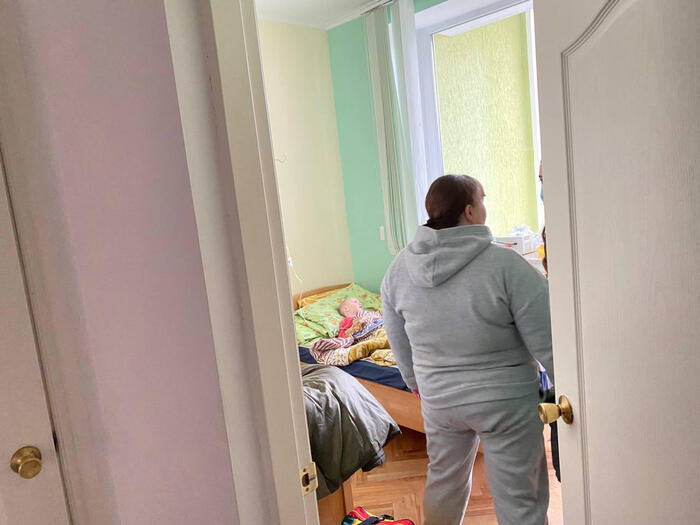David is 7 years old.
He has cancer.
Already these two things, one in a row, suck.
He is lying in his bed, in the neurology department of the Western Pediatric Hospital in Lviv, the Ukrainian center of excellence for childhood pathologies.
He has lost eyes, the drip in his arm.
Yulia, a very young doctor on duty, is walking around the wards: "Get ready, we'll leave soon".
Outside there is a bus that will take the little patients to Poland.
Then, from there, they will go to the rest of Europe.
Because in Ukraine they can no longer be treated.
The fathers carry them in their arms on the bus: evacuation to the good.
They kiss.
They say goodbye.
Men cannot go with them, they stay to fight: a tragedy within a tragedy.
"Our hospital has become the hub for the collection of all sick children with serious diseases in the country," explains Olena Koslova, medical director of the center.
"Oncology, genetic and blood diseases, rare syndromes. In the East there is no longer any possibility of treating these children and we do not have enough receptive capacity here: we welcome them, stabilize them and then they are taken abroad", she explains.
Only today about 20 children will leave, another 50 will follow.
Rotation lasts 4-5 days.
They come, they are best looked after here in Lviv, then they leave.
A wave of flood.
Which means suffering in suffering and forced farewells.
The rules are clear: if an evacuated sick child has a mother, the father must stay in Ukraine;
if the mother does not have it, then the father can go with him.
L'
the only exception is for large families: with three or more children, men can leave if one is sick.
The bureaucracy is like that, it falls like a guillotine and severs what it finds in the way.
The fathers present get on the bus to be as much as possible with their families, they will get off later.
No one can say if they will see again: war on the one hand, disease on the other.
"I do not hide it, the situation is dramatic".
Rawet Szczucinski is part of the Polish emergency intervention group (PCPM), an elite medical unit that operates in the most critical theaters in the world.
He loves Italy (he has a house in Gorizia) and loves football (he remembers the 1982 team by heart).
He was in Bergamo in the worst days of Covid.
"It was tough," he recalls showing the photos on his cell phone.
"But here it is more so.
These children are seriously ill. "Over 200 have been brought to Poland. There is another hub there that 'sorts' medical records (which are translated) according to the case. Italy is also among the countries that he is pledging to receive them. "You are giving us a great help, really," assures Rawet.
Very well. But honestly it is difficult to imagine the opposite: turning away feels inhumane.
Yet everything is happening in this war.
Just think of the Mariupol hospital bombed by the Russians, a structure very similar to the Pediatric Hospital in Lviv, with that typically Soviet layout.
The conflict has not arrived here, hopefully it will not.
But what if it arrives?
"The sirens haven't sounded in five days," says Andriy Synynta, the hospital's chief physician.
While he speaks he instinctively observes the clouds.
It is freezing cold and it continues to snow.
Next to the evacuation bus, on the square, there is a mountain of sand and the attendants are filling the bags to barricade the windows.
"Let's go to my office, we're freezing, I'll buy you some coffee", Andriy comes out after an exchange.
"No, for now we have what we need here", he assures him when you ask him if the
Europe can do more in terms of aid.
"But for heaven's sake, close our skies".
Dr. Koslova is less optimistic.
"Our patients are frail, the cancer is aggressive, they need immediate treatment, they can't wait, it's a fight against time."
On her desk table there are fresh flowers: in Ukraine, as in Russia, Women's Day is sacred.
Her children are in Warsaw, as friends, because she works 18 hours a day in the hospital and her husband is in the police: they are never at home.
You are looking for the right words.
He finds them.
"Every year we fight fiercely for every single child, to save every patient. And suddenly, poof, thousands of lives are lost. Do you understand? It's terrible, terrible."
(HANDLE).

